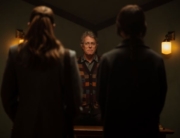
Heavy with symbolism, Koko-di Koko-da is an odd little horror film that puts David Lynch, Rob Zombie, and Groundhog Day through a blender to produce a grim parable of the effects of grief.
The film starts brightly, with only a hint of the surreal. A couple and their soon-to-be eight-year-old daughter are out at a restaurant the day before the girl’s birthday, with all three faces painted to look like bunnies. However, the wife has a severe allergic reaction to the food, and she spends a night in the hospital. The family is clearly happy, and then an unexpected tragedy happens.
Three years later, the couple, Tobias (Leif Edlund) and Elin (Yiva Gallon), go on a camping trip in a dark forest, bickering all the way. In the morning, Elin leaves the tent to relieve herself and gets attacked by an extremely odd trio: a jovial sadist in a white three-piece suit, a mute giant, and a pale-skinned, dark-haired girl with cock-eyed pigtails. They do horrible things to Elin and then set their sights on Tobias, who chooses to hide in the tent.
Up to this point, we are engaged. The beginning allows some sympathy for the characters, and Edlund and Gallon have a wonderful chemistry. The couple’s love and hope for the future is palpable. The camping section is tense and bizarre and dreamlike, yet also brutal. There’s a unique fairy-tale quality that draws you into the story and adds to the uneasiness. Writer/director Johannes Nyholm masterfully and slowly builds tension and makes viewers feel they are seeing more than they are. There is very little gore, yet the movie feels desperately bloody, and like The Birds, nothing comes with explanation. It is just happening.
And then the attacks happen again and again. The same scenario is played over about six times, Groundhog Day–style. Each comes with slight differences: one occurs at night, in another Tobias and Elin argue less, but in the end, the freakish trio get them and get them good. Eventually, you notice slight changes in Tobias’s and Elin’s behavior in each setup. Sometimes they are more callous, sometimes less pliant. Eventually the final scenario puts the theme into perspective. It’s just a hell of a slog to reach that point. That slog, along with the aforementioned brutality, diminishes the effectiveness of Nyholm’s other skills.
In the end, though, you are glad you took this journey. Well, if not quite glad, better off for it. Because what Koko-di Koko-da does well is zero in on the fact that grief, real soul-crushing grief, repeats itself day after day until eventually it doesn’t and you might, just might, be able to cherish what you have left.






Leave A Comment